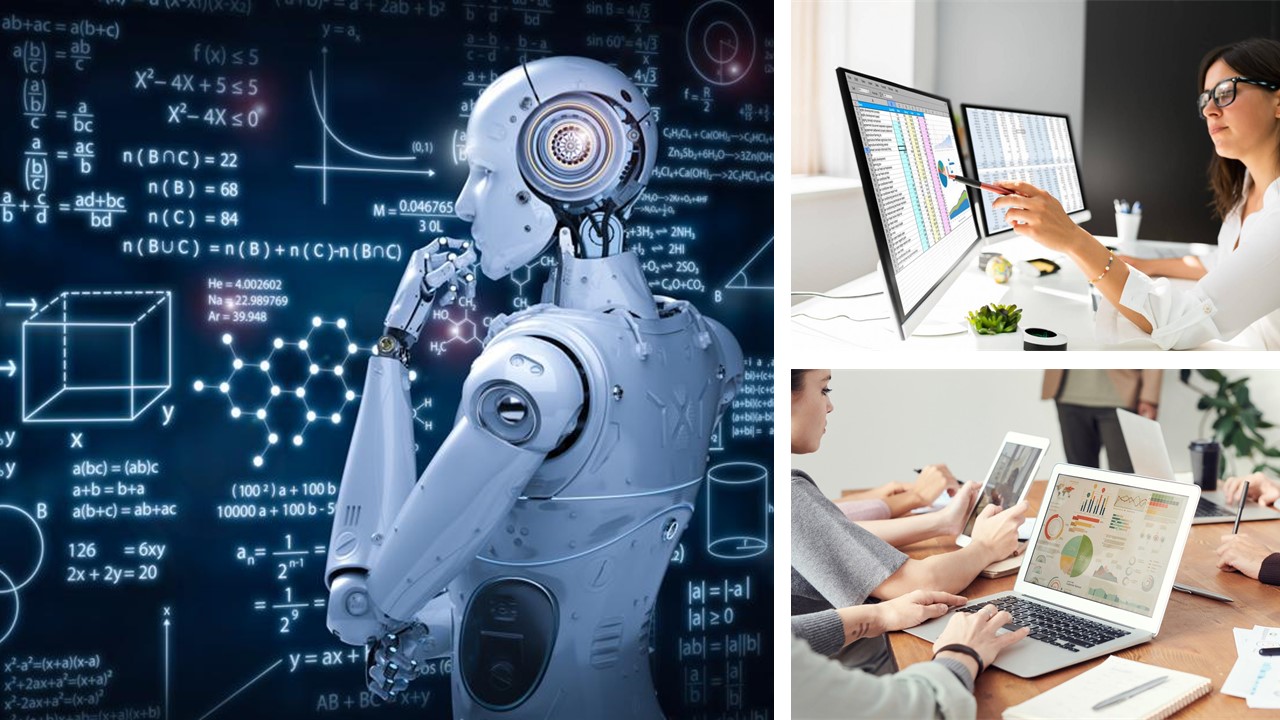Top Job Placement Consultancy in Mumbai AI (Artificial Intelligence) Machine Learning

In recent years, Mumbai and many other locations in India have seen massive advancements in AI (artificial intelligence) and machine learning. Such advancements in machine learning and AI have attracted major firms like Microsoft and Apple to set up shop in India.
Countless roles are available and most of these positions range from entry to senior level. But if you’re keen to get the best AI/machine learning job, you’ve got to contact a top job placement consultancy in Mumbai.
Reaching out to a top job placement consultancy in Mumbai increases your chances of securing career-advancing roles in AI and machine learning teams.
But before worrying about what top job placement consultancy you need to visit, you’ll need to gather more information. The machine learning/AI field is vast, and you’ll be best suited to open roles with the right knowledge, skills, and qualifications.
And you’ll need general details about AI and machine learning to perfectly understand the sector.
That’s why this article provides vital information about artificial intelligence and machine learning. With all the info in this post, securing AI/machine learning roles through a top job placement consultancy in Mumbai will be easier than you thought.
What is AI?
Artificial intelligence is the ability of computer systems to copy human functions. Through AI, machines can perform simple or complex functions like reading or solving advanced mathematical problems.
All forms of logical dependence of machines on computer programs are forms of AI. Artificial intelligence has different subsets, with machine learning being one of its most popular branches.
What is Machine Learning?
Machine learning is a direct application of artificial intelligence for computer modelling. It adopts mathematical models to aid the learning process of computers without human interference.
Machine learning allows a computing system continue its learning and improvement process based on accumulated experience.
Origin of AI and Machine Learning
1940s – 1955
Modern AI took off in the 1940s after the invention of a programmable digital computer. The computer was based on several aspects of mathematical reasoning and became a stimulant for further research.
In the 1950s, Alan Turing’s paper entertained the idea of machines being able to think in the near future. Turing’s work still receives recognition as a foundational part of artificial intelligence research several decades after.
In 1951, Christopher Strachey and Dietrich Prinz wrote programs for checkers and chess respectively. These programs were able to challenge above-amateur players without external input, becoming one of the first AI programs.
Later on, in 1955, Allen Newell and Herbert Simon created a program capable of proving mathematical theories. Suggestions were drawn from Newell and Simon’s work that machines can possess minds just like humans.
1956 – 1961
Further research sought to explore the possibility of designing a synthetic brain with near-human capabilities. The research drive led to a workshop at Dartmouth College in 1956 where AI got its foundational recognition as a discipline.
Marvin Minsky and John Mc Carthy organized this workshop in collaboration with Nathan Rochester and Claude Shannon. Many scientists and researchers recognize this 1956 conference as AI’s birthplace.
In 1958 to 1961, scientists attempted to design algorithms to help machines perform several tasks. Scientists developed STRIPS, the first program capable of controlling a robot. The same period also saw the development of interactive programs like chatter bots.
1962 – 1993
AI and in extension machine learning suffered massive setbacks for more than a decade (late 1960s to 1979).
A short boom in AI was recorded from 1980 – 1986 which led to the development of specialized hardware for AI from companies like IBM and Apple. But a second funding setback recorded between 1987 and 1993 stagnated progress in AI development efforts.
1994 – 2011
Increased capacity, speed, and performance of computers encouraged the development of AI in multiple research fields. Such advancements gained traction with events like Deep Blue (chess program) defeating a renowned chess champion.
Other advancements in robotics, intelligent agents, and neural networks improved the potential of data science into the early 2010s.
2012 onward
Development of smart systems based on artificial intelligence became widely used after the 2000s. Systems like Google’s Assistant, Apple’s Siri, and Amazon’s Alexa are examples of smart technology built by advanced AI and machine learning models.
The advancements of AI through this period cut across developments in robotics, deep learning, self-reliant software, etc.
Job Trends in Mumbai for Machine Learning Professionals
Currently, the most popular job trends for machine learning and AI professionals in Mumbai are:
- Machine Learning Engineer
- Senior Manager, Advanced Data and Analytics
- Associate Director, Artificial Intelligence & Insights
- ML/Python Tutor
- Director, Transformation, Technology, and Innovation
- Senior Software Engineer, Machine Learning
- Artificial Intelligence Consultant
- Team Lead, Analytics, Data Science and IoT
- Python Developer
- AI Software Engineer
- AI/ML Engineer
- NLP Intern
- AI Programmer
- NLP Engineer
- AI Architect
- Machine Learning Intern
- Artificial Intelligence Support Engineer
- AI/ML Developer
- Associate AI Developer
- Lead ML Engineer
Consulting a top job placement consultancy in Mumbai for an AI or machine learning role could get you into any of these trending positions. However, it’s always a smart choice to grasp the necessary skills and languages required from artificial intelligence professionals.
Supporting Languages and Skills Required from AI and Machine Learning Professionals
Apart from knowing the basics about artificial intelligence and machine learning, several skills and languages are required to excel in this field. Some popular skills and languages necessary to ace AI/ machine learning are:
Data engineering
- Pre-process (gather, enter, and convert) data
- Store pre-processed data
- Engage tools for easy storage or conversion of massive/complex datasets
- Wide knowledge of object storage applications and methods for different kinds of data
Exploratory analysis
- Discovery of vital patterns in data through exploratory analysis
- Identification of anomalies
- Formulation of hypothesis for inference
- Derivation of summary statistics for different datasets
- Creation of simple visualizations from summarized data (graphs, charts, etc.)
- Harmonizing data before modelling (eliminating correlations and outliers from the dataset)
- Extraction of information from the data to improve running or new machine learning models
Use of services
Artificial intelligence and machine learning involves the definition of advanced algorithms to support different functions. An expert in AI/machine learning should know how to leverage services for:
- Language identification
- Carrying out sentiment analysis (determination of the negative or positive level of an identified language)
- Extraction of key terms and elements (events, people, locations, etc.)
- Organization of files according to topic
- Integration of chat software into applications through text or voice format
- Adoption of natural language processing to understand a text’s intent
- Improving the overall user experience and maintain lifelike representations from machines
Some common tools like AWS SageMaker come in handy to assist artificial intelligence professionals in designing simple or advanced models.
Programming languages
Knowledge of the following programming languages is essential for experts in AI and machine learning:
- Python
- Java
- Shell
- JavaScript
- C#
- C++
- Julia
- R
- Scala
- TypeScript
Machine learning algorithms
- Knowledge of major machine learning algorithms and their application
- Performance of advanced tasks with algorithms (dialogue generation, facial recognition, image/object detection, translation, etc.)
- Knowledge of basic to intermediate principles and algorithms of artificial neural networks, language processing and deep learning
Deployment and security
- Assessment of vital parameters (scalability, performance, availability, resilience, etc.) before deployment
- Enabling auto-scaling to beat expected operational rigors after deployment
- Restriction of access to sensitive data after deployment
- Regular maintenance of deployed machine learning solutions
Other necessary skills
Apart from the skills described above, an experienced AI and machine learning engineer is expected to understand:
- Signal processing methods
- Soft skills (management skills, teamwork, efficiency, proper communication, etc.)
- Knowledge of mathematical models, domains, deep learning, and neural networks
- Cluster analysis
- Knowledge of distributed computing
- Analytical thinking
- Big data management
- Creative prowess
Scope for AI and Machine Learning Professionals in Companies
Banking
The banking sector is way ahead of several industries in terms of AI applications. Several banking systems worldwide rely on AI and machine learning for fraud detection, risk prediction, and for provision of valid financial advice.
Agriculture
Cropping predictions is a smart AI innovation that aims to determine the fertility of arable land. Other revolutions in the agriculture sector are designed by AI tools with more releases targeting disease detection, weed removal, and resource allocation.
Finance
The finance sector continues to receive several essential tools from innovations built on AI. For example, lending assessments have gradually become fully-automated over the years due to advancements in AI technology.
Business
AI is a vital part of business management and development with valid use cases in small (2 – 50) or large (50+) interests.
Businesses can also use AI and machine learning for inventory management and improvement. Some firms rely on AI to build engines for recommendations to boost customer experiences during product searches.
Transportation
Autopilot technology is one common AI tool that has been in use for decades. Also, improvements in logistics for other forms of transportation are a direct result of innovations in AI technology.
Human Resources
HR is a vital part of any organization’s success, and AI is making the process of recruiting and sustaining workforce much easier. Several tools built with AI eases candidate selection for companies and recommends best options based on available data.
Also, AI and machine learning continues to reduce the dependence on human labor for common or advanced tasks.
Manufacturing
Recent innovations in AI technology helps support the manufacturing sector for greater output and sustainable production. Manufacturing industries can employ AI experts to design a working system for wastage reduction and to support existing quality control processes.
Medicine
AI is a vital tool for medical research and for providing vital assistance to patients. Some AI tools like voice assistant technology, advanced language processing, etc. are now part of modern innovations in medicine.
Education
AI is valuable for the development of vital tools students and instructors need for improved performance. The use of artificial intelligence to educate promotes better assimilation and easier knowledge transfer between students and tutors.
Recent advancements in AI technology also makes it possible for instructors to delegate several aspects of students’ learning process to machines.
Security
Cyber-security has received several revolutionary tools since AI’s use gained massive acceptance. Companies now adopt AI tools to provide protections against anomalies. AI also provides tools companies can rely on for customer protections and information security.
Top 6 Companies in Mumbai for AI/Machine Learning Engineers
- Accenture
- Infosys
- IBM
- Tata Consultancy Services
- Tech Mahindra Limited
- Cognizant
Job Opportunities for AI and Machine Learning Professionals
Check out some top job opportunities available to machine learning and AI professionals in the following companies:
- Credit Suisse
- DLL
- Essenware PVT Ltd.
- Hexaware Technologies
- Holcim Global Digital Hub
- JioSaavn
- Larsen & Toubro Infotech
- Moonsoon CreditTech
- Morgan Stanley
- MorningStar
- MSD
- Nomura
- OnMyOwn Technology
- PeopleGene
- samespace
- SherTech Information Services Inc.
- Tata Trusts
- ai
- Zycus
Working with a top job placement consultancy in Mumbai might be your best shot at securing great AI/machine learning roles.
Conclusion
The rise in popularity and use cases of AI and machine learning makes it a lucrative career for many experts. In some cases, AI professionals could earn $160,000+ every year depending on several factors.
Building your career as an AI/machine learning professional is essential to thrive in this sector. Amassing the non-technical skills are as important as technical knowledge; AI experts must exhibit balance to develop their career prospects.
Working with a top job placement consultancy in Mumbai will ease your search for a suiting role. Just prepare, keep in touch, and you’ll be on your way to great achievements through AI for sure!




3 Responses
[…] manpower recruitment agency without seeing ads for any of these roles. Top India companies in the Artificial Intelligence and IoT 4.0 sectors usually have several positions skilled individuals can […]
[…] Average rating: 0 reviews Source […]
[…] technology sector continues to thrive with high demand for AI and machine learning experts, data scientists, software developers, and cybersecurity professionals. As businesses […]